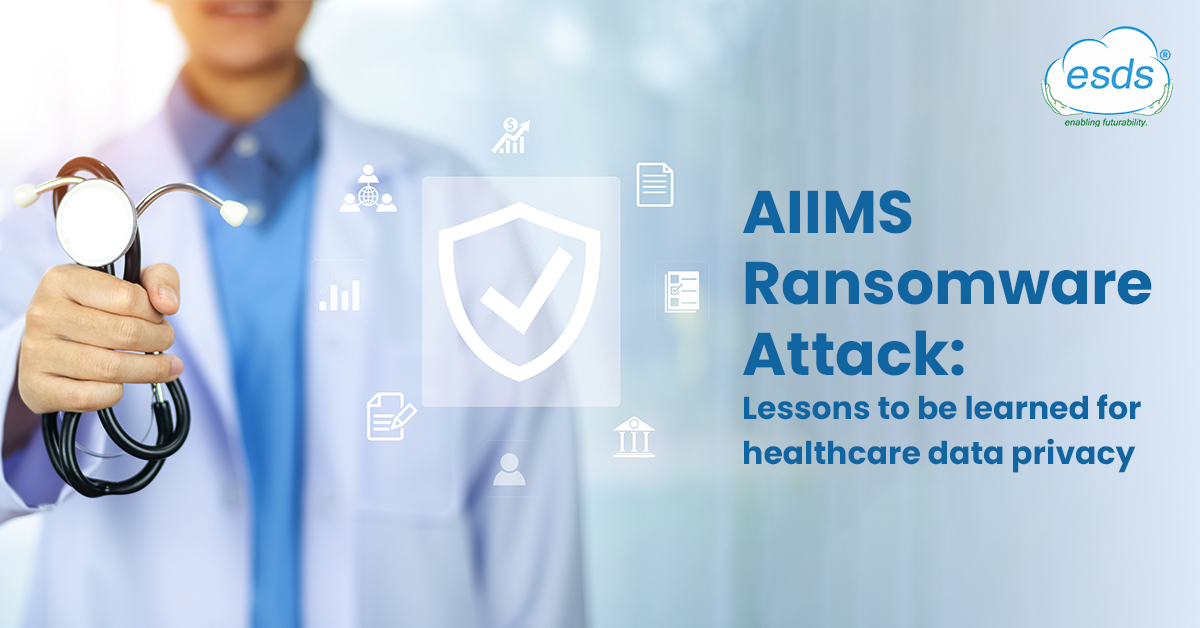AIIMS Ransomware Attack: Lessons To Be Learned For Health Care Data Privacy
The recent ransomware attack on the All India Institute of Medical Sciences (AIIMS) has brought to light once again the vulnerability of healthcare organizations to cyber threats. This attack, which affected the institution’s computer network and compromised the personal data of millions of patients, serves as a sobering reminder of the critical importance of healthcare data privacy.

With healthcare providers increasingly relying on technology to store and share sensitive patient information, it is essential to understand the lessons that can be learned from this attack and Implement measures to avoid the recurrence of similar incidents in the future. In this blog post, we will delve into the AIIMS ransomware attack and explore what can be gleaned about safeguarding healthcare data privacy in the face of evolving cyber threats.
Background on Healthcare Data Privacy

Data privacy is a critical aspect of the healthcare industry. It refers to the protection of sensitive medical information belonging to patients or individuals, such as medical history, treatments, diagnoses, and personal identification information. The increasing use of technology and digital platforms in healthcare has led to the creation and storage of vast amounts of sensitive data. Therefore, healthcare providers must take appropriate measures to ensure that this information is secure and protected from unauthorized access, theft, or misuse. Therefore, ensuring healthcare data privacy is crucial for maintaining patient confidentiality, trust, and confidence in the healthcare system.
In India, healthcare data privacy is protected by the Personal Data Protection Bill, which is currently under review by the government. The bill seeks to regulate the processing of personal data, including health data, by organizations and individuals, with significant penalties for non-compliance. Additionally, the Ministry of Health and Family Welfare has issued guidelines on the protection of personal health information, outlining best practices for healthcare providers to safeguard patient data. Despite these regulations, healthcare data breaches have been on the rise in India in recent years, with hospitals and healthcare providers being targeted by hackers seeking to exploit vulnerabilities in their computer systems. This has led to a growing awareness of the need to prioritize data privacy and security in the healthcare sector and to adopt more robust measures to prevent data breaches and cyber-attacks.
The AIIMS Ransomware Attack

It was on the 23rd of November 2022, that the servers of All India Institute of Medical Sciences (AIIMS), Delhi faced turmoil due to a ransomware attack, forcing their processes to go manual. For those who don’t know the severity of the incident, then just the fact that it took more than two weeks to get their systems online again is a clear indication of it. One more point to understand the severity is a reference to a 2019 report by Imprivata that values a single healthcare record at $250. The cyber-attack on AIIMS has resulted in the compromise of around 40 million records, which includes sensitive information belonging to some of the most influential individuals in the country. So, the value of the data is far beyond just the monetary basis.
A ransomware attack may not publicly expose the data in the initial stage, but the organization that faced the attack, like AIIMS may get locked out of their systems and data with a constant threat of their data getting public or leaked on the dark web. For the AIIMS incident, the attackers were said to have asked for a ransom of a whopping 200 Cr for the encrypted data. As said earlier, even if we keep the significantly sizeable monetary loss aside just consider the tiresome scenario of manual entry at undoubtedly the busiest hospital in India. A place where distress or delay puts the life of a patient at risk.
Preventing Ransomware Attacks: The Role of Managed Security Services

Managed Security Services (MSS) can play a crucial role in preventing ransomware attacks in your organization. Here are some pointers on how MSS can help:
- Proactive Monitoring and Threat Detection: With a dedicated security team under the Managed Security Services the service provider can proactively monitor your organization’s network and infrastructure 24/7 allowing them to identify potential vulnerabilities and threats before they can be exploited by cybercriminals.
- Patch Management: One of the main ways that cybercriminals exploit vulnerabilities is through unpatched software. MSS providers can ensure that all software and systems are regularly patched and updated, minimizing the risk of a ransomware attack.
- Employee Training and Education: MSS providers can offer training and education programs to your employees to help them recognize phishing emails and other social engineering tactics that are commonly used by ransomware attackers.
- Endpoint Protection: MSS providers can implement endpoint protection solutions that help prevent ransomware attacks from infecting individual devices, such as laptops or smartphones. These solutions include anti-virus software, firewalls, and intrusion detection/prevention systems.
- Incident Response: Even with the best prevention measures in place, it’s still possible for a ransomware attack to occur. MSS providers can help your organization develop an incident response plan to minimize the impact of an attack and get your systems back online as quickly as possible.

Lessons Learned
The AIIMS ransomware attack has highlighted several crucial lessons about safeguarding healthcare data privacy. Firstly, it is crucial to have robust security measures in place to protect against cyber threats. This includes security scanning, timely vulnerability assessment, implementing firewalls, intrusion detection and prevention systems, and other security solutions to prevent unauthorized access to IT systems. Secondly, ongoing staff training and education are critical to ensuring that employees understand the risks of cyber threats and are equipped with the knowledge and skills to identify and respond to potential attacks. Thirdly, proactive threat detection and response are essential to detecting and containing attacks before they can cause significant damage. This includes regular monitoring of IT systems for unusual activity and the implementation of incident response plans to minimize the impact of any breaches that occur. Finally, having robust data backup and recovery plans in place is critical to mitigating the impact of ransomware attacks and other types of data breaches. In conclusion, the lessons learned from the AIIMS ransomware attack highlight the importance of taking a proactive and comprehensive approach to healthcare data privacy to protect against evolving cyber threats.
Summing it Up
The AIIMS ransomware attack serves as a stark reminder of the critical importance of healthcare data privacy in the face of evolving cyber threats. The lessons learned from this attack, including the need for robust security measures, ongoing staff training and education, proactive threat detection and response, and robust data backup and recovery plans, provide a roadmap for healthcare organizations seeking to safeguard patient data in the digital age. As the healthcare industry continues to rely more heavily on technology to store and share sensitive patient information, it is crucial to prioritize data privacy and security to prevent and respond to cyber threats effectively. By implementing these lessons and adopting a proactive and comprehensive approach to healthcare data privacy, healthcare organizations can help protect patient data and ensure the integrity and safety of their IT systems.
